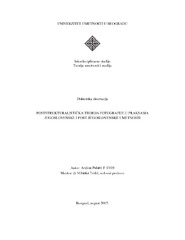Poststrukturalistička teorija fotografije u praksama jugoslovenske i post-jugoslovenske umetnosti
doktorska disertacija
Metapodaci
Prikaz svih podataka o zapisuDoktorand:
Palašti, AndreaFakultet:
Интердисциплинарне студије Универзитета уметностиDatum odbrane:
24-12-2015Mentor:
Todić, MilankaČlanovi komisije:
- Mikić, Vesna
- Lazić, Dubravka
- Dedić, Nikola
- Šuica, Nikola
Sažetak
Teorija fotografije je teorija u permanentnom nastajanju o različitim međuprožimajućim
teorijskim, istorijskim, umetničkim, tehničkim, estetskim, društvenim, ideološkim, političkim i
ekonomskim aspektima fotografije kao umetnosti. Pojavom poststrukturalizma kao
transdisciplinarnog i interpretativnog teorijskog mišljenja, teorija fotografije ušla je u polje
diskurzivnih i višeznačnih artikulacija, unutar kojeg se fotografija kao umetnost uspostavlja,
razvija, razmenjuje i primenjuje kao društvena praksa. U tom svetlu, dva ključna teorijska
sistema – semiologija/semiotika i teorijska psihoanaliza, uspostavile su poststrukturalističku
teoriju fotografije. Pristupanjem fotografiji kao vizuelnom znakovnom sistemu, odnosno – kao
višeznačnom vizuelnom tekstu koji se očitava gledanjem, poststrukturalistička teorija fotografije
ukazala je na kulturalno i društveno determinisanog označitelja što nosi bezbroj različitih,
nezavisnih i arbitrarnih značenja koje fotografija ostvaruje unuta...r semiološkog/semiotičkog
konteksta. Poststrukturalistička teorija fotografije se, tako, bavi čitanjem fotografije kao
umetnosti, koristeći se metodološkim, poetičkim, retoričkim, značenjskim i vrednosnim
kriterijumima kroz različite teorijske discipline – teorija umetnosti, teorija teksta, teorija
simulacija, teorije postmoderne, teorije o diskurzivnoj prirodi znanja i moći kao znanju,
feminističke studije, postkolonijalne teorije, teorije identiteta, teorije hibridnosti, studije kulture i
druge. Postavljena u kontekst jugoslovenske i post-jugoslovenske umetničke prakse,
poststrukturalistička teorija fotografije omogućila je platformu za iščitavanje, interpretaciju i
izvođenje pluralnih umetničkih strategija unutar (post)konceptualne i savremene umetnosti.
The theory of photography is a theory in a permanent formation of different interchangable
theoretical, historical, artistic, technical, aesthetic, social, ideological, political and economic
aspects of photography as art. With the advent of poststructuralism as a transdisciplinary theory
and an interpretative theoretical thinking, the theory of photography came into the field of theory
as an ambiguous discursive articulation, in which photography as art establishes, develops,
exchanges and is being used as a social practice. In this light, two key theoretical system -
semiology/semiotics and theoretical psychoanalysis, established the poststructuralist theory of
photography. By accessing to the medium of photography as a visual system of signs, that is - as
a multilayered visual text, which can be read by looking/watching, the poststructuralist theory of
photography pointed out a culturally and socially determined signifier, which carries a myriad of
different, independent a...nd arbitrary meaning that photography as art realises within the
semiological/semiotic context. The poststructuralist theory of photography is therefore,
concerned with reading the photographic image, using methodological, poetic, rhetorical,
semantic and value criteria through different theoretical disciplines - art theory, the theory of text,
theory of simulation, theory of postmodernism, theory of the discursive nature of knowledge and
power as knowledge, feminist studies, postcolonial theory, theories of identity, hybrid theory,
cultural studies, and others. Placed in the context of the Yugoslav and post-Yugoslav art
practices, the poststructural theory of photography enabled a theoretical platform for reading,
interpreting and executing plural artistic strategies within the (post)conceptual and contemporary art.

